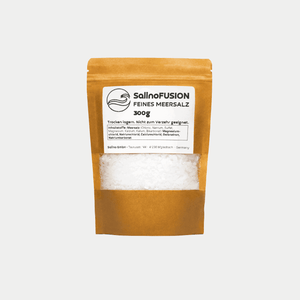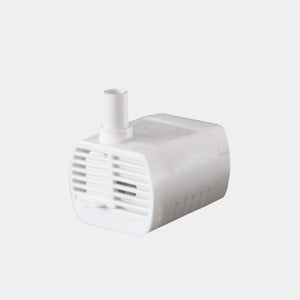When the days shimmer
There are days when it's not just the asphalt that shimmers. Your thoughts become sluggish, your body heavy, and every movement feels like passing through a thick blanket of heat. Summer is here, with all its splendor—but also its harsh demands.
The heat often creeps on. A few degrees warmer, a night with little sleep, the constant feeling of stickiness – and suddenly we realize how exhausted we are without having done any physical activity. Those who live in cities feel it especially: concrete traps heat, windows hold it in. And the nights bring little relief. Instead of a "summer like it used to be," hot days today increasingly feel like a test.
But there are ways to live with the heat without losing yourself. Ways that go beyond just cold showers or air conditioning. It's about small rituals, smart choices—and listening to your own body when the world gets too loud, too hot, too fast.
Physical self-care: Don't fight the heat, breathe with it
Many people believe they just have to "stick it out." Continue working as usual, eating as usual, sleeping as usual—as if summer were just a calendar entry. Yet our bodies send clear signals: It needs less, but more consciously. It demands cooling—and by that, it doesn't just mean external cooling.
It's important to rediscover your own rhythm. If possible, adjust your working hours: start earlier, finish earlier. It's also better to take walks in the morning or late evening. Our biorhythm is oriented toward light anyway – and the less we live against it, the easier our day will be.
Cooling foods like watermelon, mint, cucumber, or buttermilk aren't just pleasant in the moment—they actually help the body regulate itself. Heavy meals, on the other hand, make you sluggish and place additional strain on your circulation.
And what's often underestimated: Not all drinks are created equal. Ice-cold water can give your circulation a short-term shock. Lukewarm drinks, perhaps with a squeeze of lemon, refresh you in a more subtle, lasting way. And sometimes just a cloth dampened with water around your neck is enough to calm your pulse.
Rooms of coolness – and retreat
 Architecture and everyday life: Shadow is the new luxury
Architecture and everyday life: Shadow is the new luxury
It starts with the apartment. What sounds banal can be crucial: close the shutters during the day, draw the curtains, and tighten the windows. Don't ventilate while it's warmer outside than inside. Only when the temperature calms down late in the evening can you open the windows wide – for a little airflow and a feeling of space.
A fan alone rarely provides real cooling, but combined with a damp cloth in front of it or an evaporative effect (e.g., damp laundry in the room), it can help make the indoor climate more pleasant. It's not about "beating" the heat. It's about embracing it without surrendering to it.
Rituals of retreat: When the body calls silently
Heat demands retreat. It requires breaks, a moment of inner calm. The siesta principle used to be known – and it was more than a cultural relic. It was a physiological insight: In the midday heat, our energy levels drop, our blood pressure plummets, and our heads feel heavy.
Today, many people pretend this can be ignored. But the key often lies in taking a break. A short nap, a moment on the cool tile floor, ten minutes of meditation with your eyes closed – these aren't signs of weakness, but acts of self-care. In a world that always demands "more," "less" can be the greatest form of resilience.
Heat in the city – and how we can deal with it
Micro-escapes: Green between concrete
 Urban greenery isn't a luxury—it's a survival strategy. Parks, cemeteries, shady courtyards: they cool the air, slow the pace, and calm the senses. Those who walk the same street every day might at some point notice a tree casting a shadow. There's a fountain where you can cool your hands. And there: a church with its open doors—cool, serene, and quiet.
Urban greenery isn't a luxury—it's a survival strategy. Parks, cemeteries, shady courtyards: they cool the air, slow the pace, and calm the senses. Those who walk the same street every day might at some point notice a tree casting a shadow. There's a fountain where you can cool your hands. And there: a church with its open doors—cool, serene, and quiet.
In such moments, micro-escapes become breathing spaces. No long journeys or major trips are required. It's enough to change your perspective, to reinterpret your surroundings. Cities—for all their noise—can also be places of retreat. You just have to want to find them.
The social factor: Shared heat is half the heat
During heatwaves, we realize how vulnerable we are—and how dependent we remain on one another. Older people, the chronically ill, children—they suffer particularly from the summer heat. Those who are attentive can help. A chat at the door, a glass of water, a trip to the pharmacy.
Heat raises awareness – socially too. When we begin to think not only about our own cooling, but also about that of others, community develops. And sometimes it's precisely these gestures – the offer to sit for a few minutes in one's own cool hallway – that improve not only the temperature but also the atmosphere between people.
Conclusion: Coolness as an attitude – and a return to slowness
Heat is more than just weather. It's a condition that forces us to react. Not with panic, but with mindfulness. Summer shows us what we've forgotten: that our bodies are sensitive, that breaks are healing, that we don't have to fight everything.
Those who learn to listen to themselves—whether it's 35 degrees Celsius or 15—regain something that's often lost in everyday life: a connection to their own rhythm. And perhaps that's precisely where true cooling down lies—not in ice water or a high-performance fan, but in the decision to take things more quietly, more calmly, more consciously.
A summer that not only challenges us, but transforms us. That not only melts, but clarifies. That shows: less can be more. And cooling often begins within—not without.
And when the air becomes too heavy…
 ...there are ways to gently support your home. Those who suffer from stuffy, dry indoor air can consider using a mini saline. Such devices produce salty air, similar to that found at the seaside – which is particularly beneficial for people with sensitive airways, allergies, or chronic coughs.
...there are ways to gently support your home. Those who suffer from stuffy, dry indoor air can consider using a mini saline. Such devices produce salty air, similar to that found at the seaside – which is particularly beneficial for people with sensitive airways, allergies, or chronic coughs.
The mini saline operates silently, is easy to use, and requires no ultrasound or filter changes. A small helper – not just for hot days, but for anyone longing for freer breathing and better sleep. Discreet, understated, and complementary.



